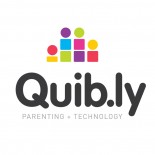Quib.ly Team Blog
Join the first members-only community that helps parents give their kids a head start in this connected world.
The things we think and do not say (about e-safety)
 James Diamond provides training and advice on e-safety and safeguarding and is a popular expert on Quib.ly. Here he busts some myths and rights some wrongs about e-safety.
James Diamond provides training and advice on e-safety and safeguarding and is a popular expert on Quib.ly. Here he busts some myths and rights some wrongs about e-safety.
Sadly, or ironically, in an age where information, facts, and expert analysis is at our fingertips like never before, powerful (and downright loud) voices in politics and the media continue to pedal confusion, half-truths, and untruths to further their political, social, and moral crusades.
Diane Abbott, Labour MP and shadow minister for public health, says: ‘Porn is the biggest driver of traffic to Google. You cannot allow the industry to drive the pace of change. So much money is riding on what happens.’ – FALSE
The Daily Mail: ‘David Cameron is to order Google to ban child pornography from the internet in a bid to prevent further murders like those of Tia Sharp and April Jones ‘– Child abuse images are ALREADY illegal, and Google doesn’t have the power to ban anything.
If you read the recent press coverage of the horrifying and incomprehensible murders of two young girls in England, you may deduce the following as facts:
- Child abuse images are readily and easily available at the drop of a Google image search
- ‘Violent pornography’ has a proven link to sexual crimes
- Google is the same thing as the Internet
None of the above is true, and the fact this may surprise some people is a damning indictment of the lack of education in this area, particularly for parents.
Yes, young people are exposed to more pornography, harmful content, and potentially dangerous contact with strangers than ever before; although the problem isn’t as bad as some would make out.
But does anyone really think that relying on the centralised and blanket intervention demanded by politicians and enacted by multinational corporations is the answer?
Here’s why blocking pornography/harmful content at source won’t work and why it could actually do harm
Won’t work:
- Not every parent will opt to have adult content blocked, and the EU Kids Online study showed that 57% of 9-16-year-olds access the internet at a friend’s house.
- Children are already finding their way around some very sophisticated and tough to crack restrictions in our schools, so what chance does the average home network stand?
- The technology just isn’t reliable enough yet, and will inevitably block legitimate sites, while letting harmful sites through.
Could do harm:
- Parents will rely on a false sense of security and, if they are relying on a technological solution, may fail to engage with, and monitor their child’s internet use with their own eyes.
- Teenagers searching for advice on sexual health, sexuality, eating disorders may find useful and official sites blocked, which could in turn lead them to seeking dangerous or misleading advice, or to ignore the problem out of a sense of shame.
The answer:
- Whole school education of the public. The best way to protect children is to know the facts, and to engage in an honest open dialogue with young people.
- No more blatant distortion of the facts from politicians and the media.
- No more cuts to CEOP – a vital organisation in the UK who are making a real difference at the sharp end of this issue in both the education of children and parents, and in the detection and prosecution of very dangerous people abusing children using technology.
- Companies to help parents make an informed choice, not relying on defaults.
Although we live in a very different (and to some, frightening) world compared to just 10 years ago, we haven’t actually changed or evolved as people.
Technology is benign, like money, it’s what you do with it that can enrich, or ruin lives.
There is no Skynet. There is no Matrix. There is no artificial intelligence, and at times no natural intelligence when it comes to people using technology. Technology isn’t something to be afraid of, or stigmatise. It is a tool of opportunity and empowerment.
Every invention since humans first struck flint over dry tinder has been utilised to harm almost as quickly as it has to elevate humankind. The internet is no different.
- To read the full post and others, visit Jamesdiamondtraining.com
- Follow James Diamond on Quib.ly

